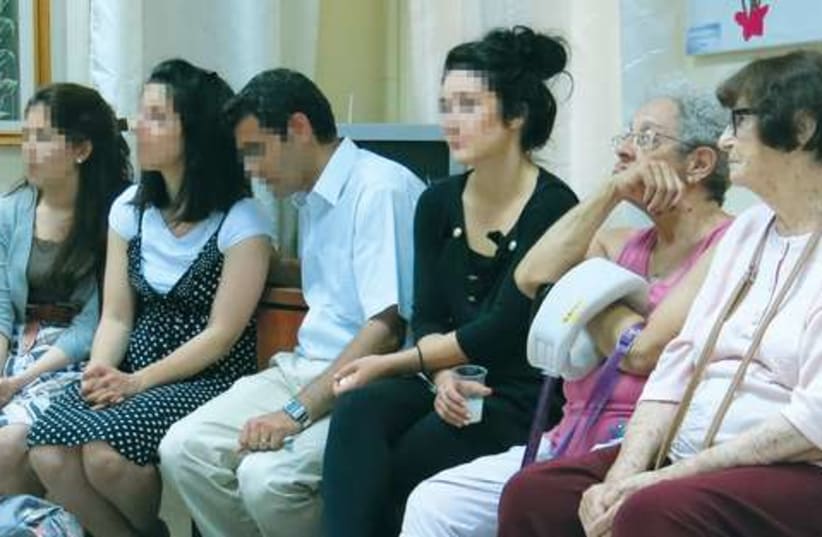Iranian President Mahmoud Ahmadinejad has spent the past eight years championing the ignoble cause of Holocaust denial, and his disturbing message has impacted younger generations far and wide.But as he departs from office, a group of young Iranians came face-to-face with the reality of the Holocaust during an unusual encounter at an assisted living home in Haifa.Most of the group were born in Iran as Muslims, but today they are Christian converts living in Britain. Members of an Evangelical church in London, they came to Israel last month to visit the Bible sites but also to meet Israelis.While passing through Haifa, the 15 young men and women of Iranian descent learned of an elderly home that cares for Holocaust survivors and wanted to pay a visit. There they heard, for the first time in their lives, personal stories about life in the ghettos and Nazi concentration camps.Usually, every group that visits the home leaves deeply touched by its residents, who now number around 85 Holocaust survivors. But this encounter was even more exceptional.With the help of translators, survivor Shoshana Kolmer began sharing her story of being taken from her home in Hungary at age 21 to Auschwitz, where most of her family was killed. She told her story in as much detail as she could remember, naming loved ones who perished in the gas chambers, and showed the group the number tattooed on her arm.Moving from one camp to another at the end of the war, somehow Kolmer survived – but barely.“Even when I had typhus and other diseases, I did not dare to go and see a doctor because it was the end, they would kill me,” she said.Listening to one testimony after another, every single one of the Iranian visitors welled up with tears at what they were hearing.“I just don’t understand,” said a shaken Morad (real names withheld due to relatives still in Iran). “How could a neighbor do that to a neighbor... They were friends, they lived together.”“We used to be good neighbors,” one of the survivors responded. “Now we wait until we’re good neighbors again. Like here, like right now.”As Kolmer finished her story, the group leader, Darius, approached and knelt at her feet.“It is difficult to accept what happened to you, and to understand what we are hearing, probably only God can,” he said. “But we want to listen to you, and we pray for you.”Darius added that as a child, he was raised to hate Israel.“I am from Hamadan in southern Iran,” said Darius. “Every morning at school the day was opened with the shout, ‘Death to Israel.’ Only years later when I became a Christian, I realized it was the land of Abraham, Isaac and Jacob. I’m very happy we came here and heard these things.”The survivors and Iranian visitors began mingling and speaking to each other one-on-one. There were more stories, and many more tears to be wiped away. The Iranians, most of them still students, admitted that they have learned about the Holocaust in school but this was the first time it became real to them.“Coming here was the most important part of our trip,” Jannat told the survivors. “You shine brightly! I thank God for your lives. Your stories will live with us, and in us. You don’t even realize what great impact you have made on us! We will never forget you, and we will tell all our friends about you.”During the visit, the subject of Ahmadinejad’s Holocaust denial came up. The survivors said they were outraged by his claims.“I would like Ahmadinejad to look me in the eyes and say to my face that it did not happen,” insisted Esti Lieber, who was a small child when the Germans burned her family’s house and killed her parents.“I have not been able to call ‘Mama’ or ‘Papa’ since I was five years old. My childhood was cut short! I want Ahmadinejad to explain to me how that didn’t happen!” The Iranian visitors felt embarrassed by their native country’s leaders and the way the world sees Iran.“It’s humiliating,” one young girl related. “Iranians don’t think that. Most of us know and realize that the Holocaust happened, and what a horror it was. It’s embarrassing that they say this. Please don’t associate it with all our people. We have no real way to influence the Iranian government, but we can pass on the stories we heard here.”Shimon Sabag, director of the home, noted that the survivor’s greatest fear is that one day no one will remember them or the horrors they endured.“Here they had an opportunity to tell their story and in this case they especially wanted their message to reach those who deny the Holocaust,” explained Sabag, who operates the home through his charity Yad Ezer L’Haver, with funding from the International Christian Embassy Jerusalem.“This meeting was outside the box,” he added. “There is paramount significance to the fact that Iranian expatriates will tell the story and spread it. There was great satisfaction to see the productive dialogue between the young and the survivors.”
